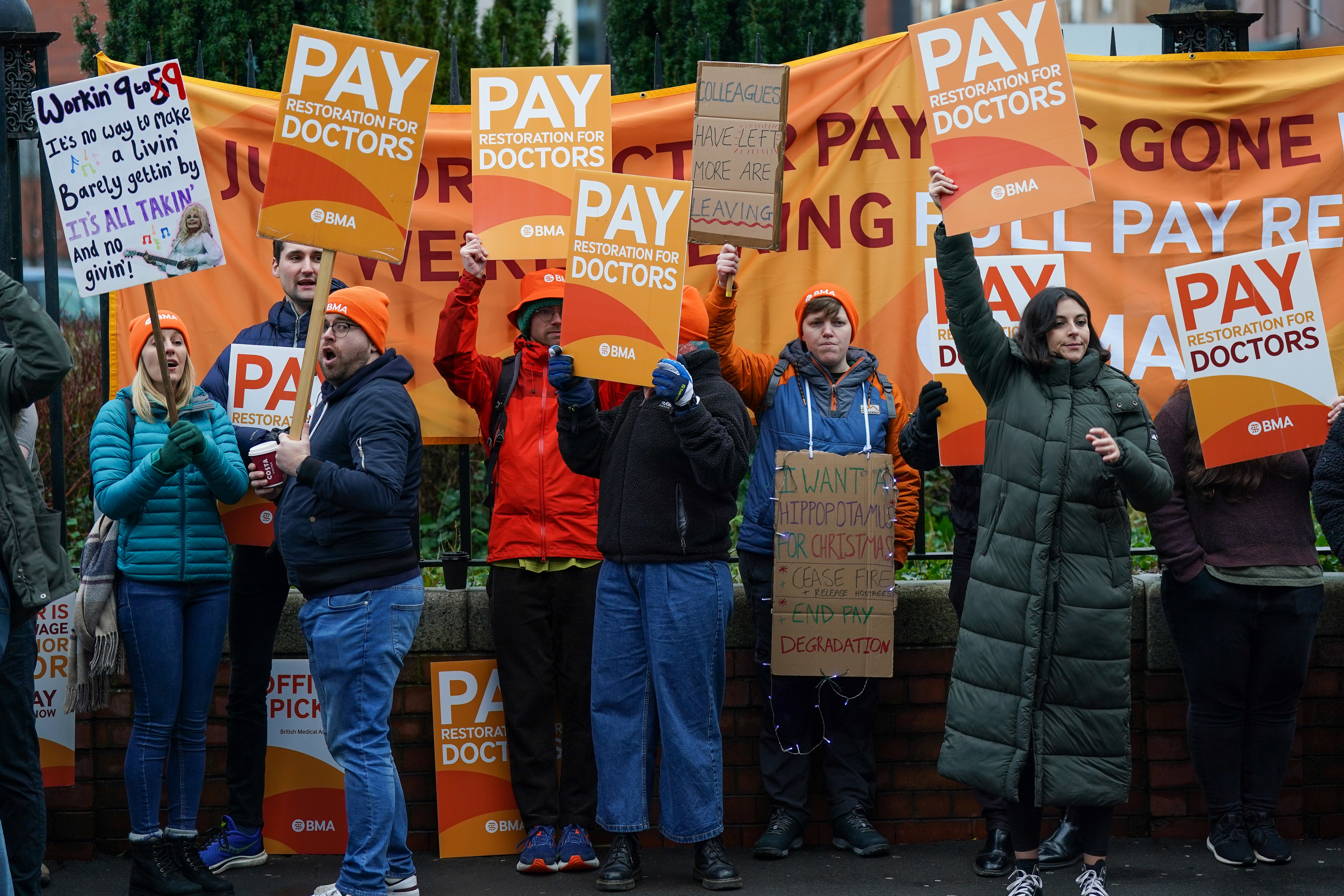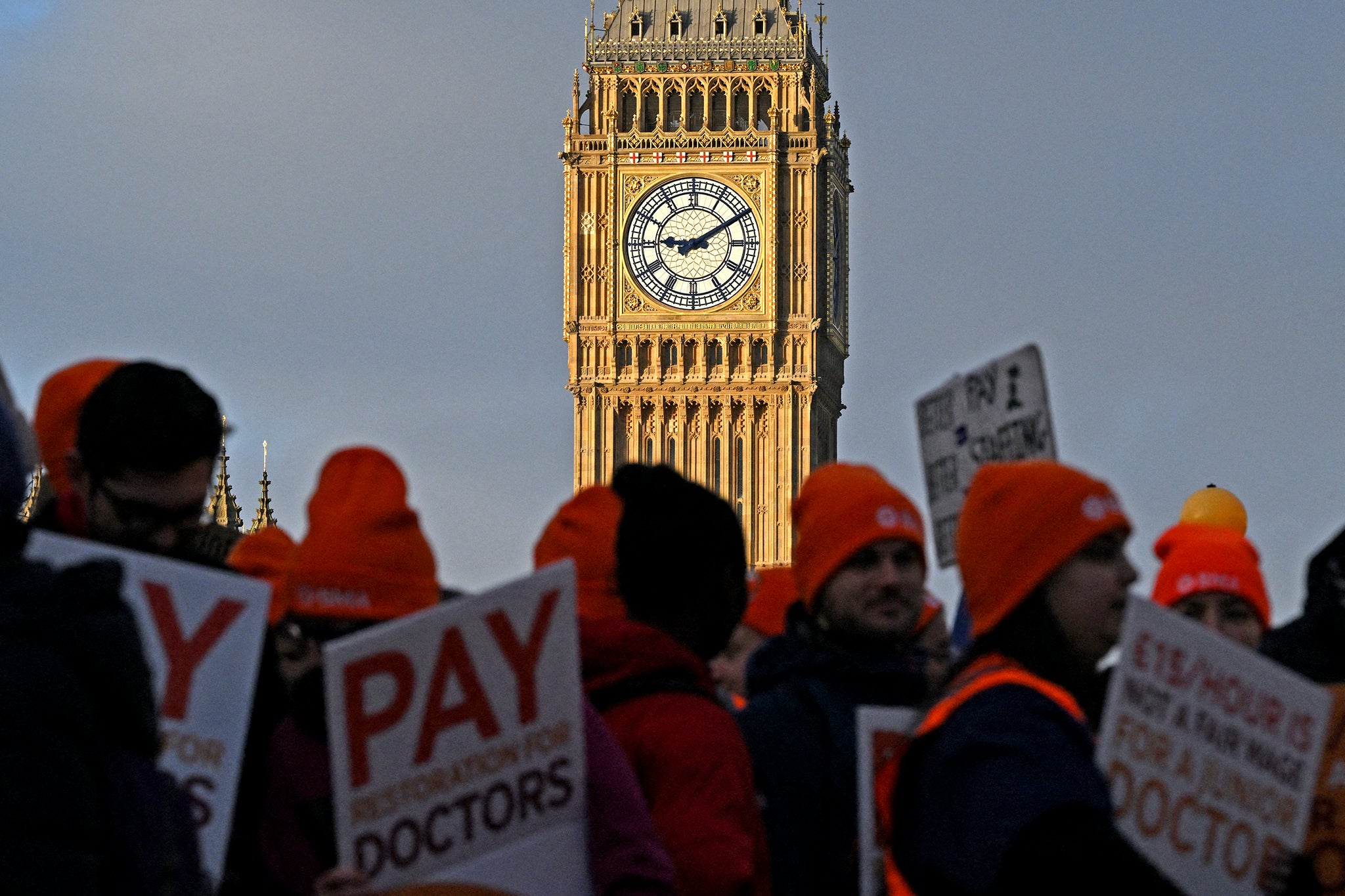Junior doctors’ union hints at end to NHS strikes saga
Sign of hope comes as NHS bosses warn they need ‘light at the end of the tunnel’
Doctors’ leaders hinted at an end to a damaging series of NHS walkouts on Wednesday as junior medics began the longest-ever strike in the history of the health service. The number of operations and appointments axed because of the action is expected to top a million this week, and comes on the heels of more than a year of disputes involving nurses and consultants.
But the union representing junior doctors signalled a softening in its position at the start of six days of industrial action, as NHS bosses called for “light at the end of the tunnel”.
Vivek Trivedi, co-chairman of the British Medical Association’s junior doctors’ committee, said he was happy to spread out his union’s demand for a 35 per cent pay rise “over a number of years”, as he indicated a willingness to get back around the negotiating table.
He also told the government a “credible offer” that the union could “build on” could halt this week’s strike.
An end to the strike would be a boon to millions stuck on growing NHS waiting lists and boost Rishi Sunak’s efforts to meet one of his key pre-election pledges.
But the sign of hope came as millions of commuters braced themselves for another damaging strike next week.
Walkouts planned by London Underground staff belonging to the RMT union are set to cause huge disruption in the capital for four days. Tube passengers have already been advised to use the service only if their journey is “essential”.
As the lengthiest strike in NHS history got under way, health service leaders warned its impact would be felt for “weeks and months” as appointments are rescheduled and the NHS works to make up for lost time.
One hospital has declared a critical incident while others reported significant waits in A&E departments – with one warning patients they faced waits of up to 11 hours.
Professor Sir Stephen Powis, national medical director for the NHS in England, warned the strike coincided with one of the busiest and most challenging weeks of the year, when the NHS was already battling a surge in demand for treatment.

Matthew Taylor, the chief executive of the NHS Confederation, which represents NHS Trusts, called on both sides to restart negotiations.
He told The Independent: “While there feels as though there is a basis for talks to resume, neither side has made the first move and I would urge both sides to meet now. This dispute is having a huge effect on patients and could further jeopardise efforts to recover services and tackle waiting lists.”
He added: “If an agreement is not reached there is the risk that further strikes will result in more appointments and operations cancelled, with more patients facing even longer waits.”
Sir Julian Hartley, the chief executive of NHS Providers, which represents trust leaders, said: “We can’t go on like this. Industrial action dragging on for months doesn’t bear thinking about.
“Trust leaders are desperate for the government and unions to break the deadlock and stave off more walkouts. We need to see fresh efforts to find a resolution to this dispute, especially as the threat of even more stoppages from other NHS workers hasn’t gone away.
“The effects of more than a year of strikes on patients, staff morale and NHS finances have been massive and will only get worse the longer this goes on. We need to see a light at the end of the tunnel.”
The government insists it is willing to talk to striking doctors but not with the threat of industrial action looming.
The health secretary Victoria Atkins had called on the BMA to call off the strikes, and start 2024 “right”.
In an interview with the BBC, Dr Trivedi said: “Anyone from the government could still come to us today and if we thought that offer was credible, and if we can resume talks and build on that, then we can stop our strike action for the rest of the week.”
He also said the BMA’s demand of a 35 per cent pay increase did not necessarily have to be delivered in one go.
“We’re not even saying it has to happen in one year. We are very happy to look over details that would span a number of years – but what we need to do is to start a way towards that and not further that pay erosion," he said.
Dr Trivedi said that while he hoped ministers came back to the negotiating table immediately, “from all of the signals they are sending, it won’t be until our strike action finishes. And I hope at that point we can come to a resolution.”
Government sources indicated they believed there had been a significant change in tone from the BMA. However, they accused doctors’ leaders of walking away from previous talks and signalled the two sides could still struggle to find a resolution.

The BMA argues that junior doctors’ pay has been cut by more than a quarter since 2008.
Last summer, they were awarded an average rise of 8.8 per cent. But medics said the increase was not enough.
Late last year, both sides entered talks but after five weeks of negotiations, these broke down and more strikes were called.
Consultants have agreed a deal with ministers, which is currently being put to members.
Shadow health minister Andrew Gwynne said: “It’s time for the Conservatives to stop playing games with our NHS, get around the table with junior doctors, and negotiate an end to these long-running strikes today.”
Lib Dem health spokesperson Daisy Cooper said: “This Conservative government is putting people’s health at risk by failing to bring these strikes to an end.”
Join our commenting forum
Join thought-provoking conversations, follow other Independent readers and see their replies
Comments
Bookmark popover
Removed from bookmarks